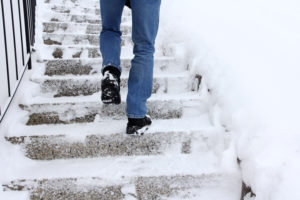 Nationwide, more than 800,000 people per year are injured severely enough to be hospitalized by slip and fall accidents. Twenty percent of these are due to injuries to the head or a broken hip. Tragically, deaths from falls have increased 30% in recent years.
Nationwide, more than 800,000 people per year are injured severely enough to be hospitalized by slip and fall accidents. Twenty percent of these are due to injuries to the head or a broken hip. Tragically, deaths from falls have increased 30% in recent years.
If you or a loved one has slipped or fallen and injured yourself on a landowner’s property in New Jersey, you may be injured. You may be wondering if you can bring a legal case against the landowner. What is the liability of a landowner in New Jersey if you slip, fall, and injure yourself on the landowner’s property? Could you bring a case?
Liability of a Landowner in New Jersey
For a landowner to be liable in New Jersey, several things must be true. First, the landowner must own the property on which you slipped and fell. If you fell on adjacent property owned by someone else, you could not sue the property owner of an adjacent property.
Second, the landowner must have a duty of care to keep the property safe, so that either invited people or people doing business on the landowner’s property do not slip due to unsafe conditions. The classic example of this is a store owner who owns the store. If a carton of milk is spilled on the floor, the landowner must clean up the spill and make the floor safe again.
The landowner must have known that there was an unsafe situation as well, or had sufficient time and opportunity to know.
Plus, the landowner with the duty of care must also have had what a reasonable person would consider a reasonable amount of time to make the area safe again. If you slip on un-shoveled snow on a homeowner’s driveway and fall, for example, during the middle of a snowstorm, a court may find that the landowner did not have a reasonable time or opportunity to make the driveway safe, as snow was still coming down.
You must have had access to the landowner’s property, either because you had business at a place of business or because you were invited in. Note that if you are trespassing on a landowner’s property, or have entered illegally, there is no duty of care under New Jersey law. In fact, you are classified as a trespasser. The only legal requirement a landowner has is to avoid explicitly harming you if you have no intent to commit a crime.
Comparative Negligence in New Jersey
You should know, too, that New Jersey slip and fall cases operate under comparative negligence. That means any financial compensation you receive in court can be reduced by the percentage that the court finds you liable for your own slip and fall. Defendants in a slip and fall therefore often argue that the injured party was responsible.
They may claim that the dangerous area was marked as such, with signs or with tape blocking the area off. They may argue that the danger should have been obvious to you, so proceeding was your responsibility. They can also argue that you were not paying attention to your surroundings or that your shoes caused you to slip – or at least did not prevent a slip.
If You Need a Slip and Fall Lawyer in New York or New Jersey
The seasoned attorneys at Kantrowitz, Goldhamer & Graifman have four decades of experience in slip and fall cases in New Jersey. We will fight for fair and just compensation for our clients.
For a complimentary case review with a NJ slip and fall lawyer, call us today toll free!
Additional Information:
- U.S. Centers for Disease Control and Prevention. Important Facts About Fall. https://www.cdc.gov/homeandrecreationalsafety/falls/adultfalls.html.
- U.S. Centers for Disease Control and Prevention. Older Adults Fall. https://www.cdc.gov/homeandrecreationalsafety/falls/index.html.
